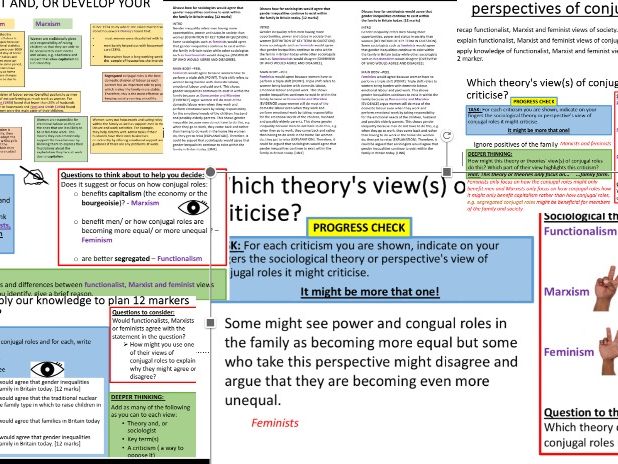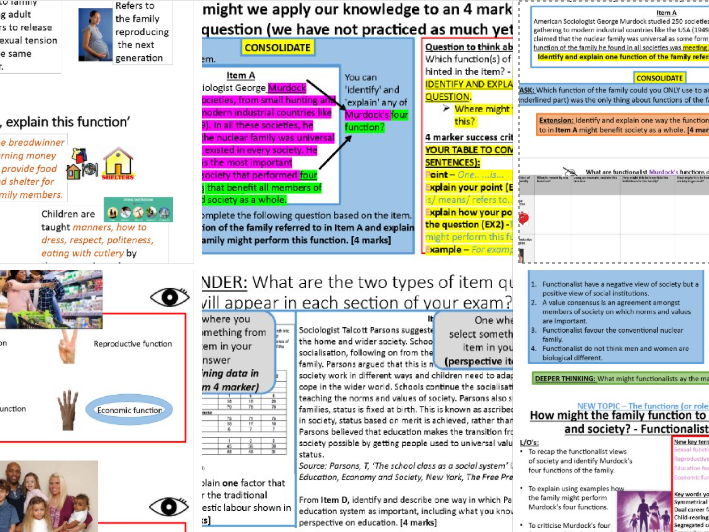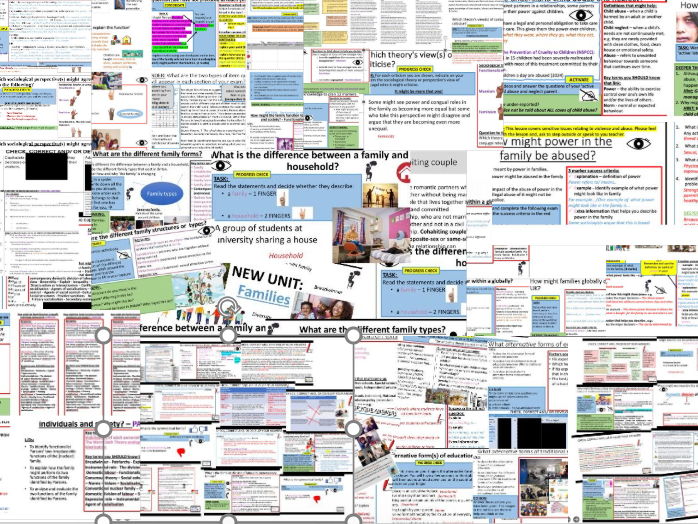Resources included (12)

AQA GCSE Sociology: Family - Sociology perspectives on conjugal roles

Families - Families in a global context

AQA GCSE Sociology - family: Functionalist function of the family (Murdock)

AQA GCSE Sociology: Families - Functionalist functions of the family (Parsons

AQA GCSE Sociology: Families - Domestic violence

AQA GCSE Sociology: Families - Power in the family

AQA GCSE Sociology: Families - The domestic division of labour in contemporary families

AQA GCSE Sociology: Family- Marxist functions of the family (Zaretsky) - UPDATED

AQA GCSE Sociology: Family - Feminist functions of the family

AQA GCSE Sociology - Education: Alternative forms of education

AQA GCSE Sociology Different family structures introduction

AQA A-level Families- Couples: Traditional views of the domestic division of labour
Topic 1 - Different family forms
L1 Different family forms and structures:
Detailed lesson with lots of scaffolding based on adaptive teaching that help students understand alternative forms of traditional education (e.g. describe the alternative forms of educational provision, explain how the different forms of educational provision differ to traditional forms of education, analyse and evaluate the alternative forms of educational provision.
Covers the following key terms: Home education/ home-schooling, Democratic education/ de-schooling, Vocational education and training
Key sociologists mentioned that students should already be aware of: Illich (extension)
Answers to all main activities included
Resources can be found at the end of the PPT.
L2  Alternatives to the family:
Detailed lessons with lots of scaffolding based on adaptive teaching that help students understand different family structures
Covers the following key terms: family, cohabitation, household, family form, family diversity, nuclear family,lone-parent family, same-sex family, reconstituted family, extended family and empty-nest family.
Answers to main activities are included
Students should know the following key terms prior to reading: contemporary society, homosexuality, heterosexuality
Resources can be found at the end of the PPT
Made to meet the AQA spec but can be used (and edited if needed) for other exam boards.
L3 How might families differ within a global context:
No starter activity
REQUIRES OWENS AND WOODFIELD AQA GCSE TEXTBOOK FOR MAIN ACTIVITIES
Answers for MAIN activities included.
Topic 2 - Couples
L4 Domestic division of labour in traditional families:
Detailed lesson with lots of scaffolding based on adaptive teaching that help students understand what might be the domestic division of labour in traditional families.
Covers the following key terms: Domestic labour, Domestic division of labour, Conjugal roles, Joint conjugal roles, Segregated conjugal roles, Instrumental role, Expressive role
Covers the following sociologists: Parsons, Oakley
Includes an activity based on ‘teaching to all’ pedagogical technique
Makes links to functionalist and feminist views of society that students might have learnt previously
Includes icons for visual learning
ANSWERS TO ALL ACTIVITIES EXCLUDING FOR PLENARY
Includes an Item B 4 marker and detailed scaffolding to help students answer this (see worksheet for this)
RESOURCES CAN BE FOUND AT THE END OF PPT.
L5 Domestic division of labour in contemporary families:
Detailed lesson with lots of scaffolding based on adaptive teaching that help students understand what might be the domestic division of labour in contemporary families.
Cover the following key terms: Contemporary society, The Symmetrical family, The New man, Double shift / dual burden, Triple shift, Dual-career family
Covers the following sociologists: Functionalist Young and Wilmott, Feminist Oakley, Feminist Dunscombe and Marsden, Feminist Hochschild
ANSWERS TO ALL ACTIVITIES INCLUDED
Includes icons for visual learning
Includes activity based on ‘teaching to all’ pedagogical technique
Included a key term sheet and definitions for the lesson
RESOURCES CAN BE FOUND AT THE END OF THE PPT
REQUIRES OWENS AND WOODFIELD AQA GCSE TEXTBOOK FOR MAIN ACTIVITIES (OR ANY EQUIVALENT INFORMATION ON DECISION MAKING AND MONEY MANAGEMENT IN THE FAMILY) - for one actvitiy.
L6 Power in the family:
Detailed lesson with lots of scaffolding based on adaptive teaching that help students understand how might power be divided in families.
Cover the following key terms: Conjugal relationships, Power
Cover the following key sociologists: Edgell, Pahl, Opinium Research, survey
Starter activity enables students to recap content they should or might have learnt before this lesson within the families unit
ANSWERS TO ALL ACTIVITIES INCLUDED
REQUIRES OWENS AND WOODFIELD AQA GCSE TEXTBOOK FOR MAIN ACTIVITIES (OR ANY EQUIVALENT INFORMATION ON DECISION MAKING AND MONEY MANAGEMENT IN THE FAMILY)
Includes icons for visual learning
RESOURCES CAN BE FOUND AT THE END OF THE PPT
Includes a discussion activity with lots of scaffolding
Includes a 3 marker with detailed scaffolding and a student friendly mark-scheme.
L7 Domestic violence:
Detailed lesson with lots of scaffolding based on adaptive teaching that help students understand how might power in the family be abused.
Cover the following key terms: Domestic violence
Covers the following organisations:The (BCS) British Crime Survey, NSPCC (National society for the Prevention of Cruelty to Children
Icon for visual learning
Enables students to look at how power imbalance between adults and children can lead to different forms child abuse.
Includes 3 marker on power as starter with detail scaffolding.
INCLUDES ANSWERS FOR MAIN ACTIVITIES (excluding starter and plenary)
Includes discussion activity to encourage oracy.
L8 Sociological perspectives of conjugal roles and relationships: Detailed lesson with lots of scaffolding based on adaptive teaching that help students understand functionalist, Marxist and feminist views of conjugal roles and recap functionalist, Marxist and feminist views of society.
Covers the following sociologists: Functionalists, Marxist, Feminists, Boulton, Allen and Crow (2001), Oakley, Ferri and Smith (1996)
Resources can be found at the end of PPT
Includes a model intro and PEEL paragraph for a 12 marker.
No starter activity
ANSWERS TO MAIN ACTIVITIES INCLUDED
Includes four 12 markers on this lesson and detailed scaffolding to help students with answering them.
Includes a teaching to all activity.
Topic 3 - The functions of the family
L9 Functionalist Murdock:
Detailed lesson with lots of scaffolding based on adaptive teaching that help students criticise Murdock’s four functions of the family and analyse them by considering how they might benefit individuals and society as a whole.
Cover the following key terms:
Sexual function
Reproductive function
Education function
Economic function
Covers the following sociologists:
Murdock
ANSWERS TO SOME/ MOST/ ALL MAIN ACTIVITIES INCLUDED
*Key terms students should know:
Symmetrical family, Dual burden, Dual career families, Triple shift, Emotion work, Child-rearing,Primary socialisation, Segregated conjugal roles, joint conjugal roles, Expressive role, instrumental role, Breadwinner, Functionalism, Organic analogy
RESOURCES CAN BE FOUND AT THE END OF PPT
Includes 'teaching to all activity
ANSWERS FOR ACTIVITIES INCLUDED
Plenary helps students develop their ability to read and interpret exam items.
Includes a key term and definition sheet for the lesson (new key terms but also makes links to key terms students should have previously learnt).Includes key term and definition sheet for the lesson.
L10 Functionalist Parsons:
Detailed lesson with lots of scaffolding based on adaptive teaching that help students understand how might the family function to benefit individuals and society.
Cover the following key terms: Stabilisation of adult personalities (The Warm Bath Theory), The Warm Bath Theory analogy , Idealisation
Cover the following key sociologists: Parsons
Plenary includes an Item B 4 marker with detail scaffolding to help students answer it
Includes key term sheet for the lesson with key terms and definitions (and makes links to key terms students should or might know that link)
No starter activity
ANSWERS TO SOME ACTIVITIES INCLUDED
RESOURCES CAN BE FOUND AT THE END OF PPT.
L11 Marxist Zaretsky:
Detailed lesson with lots of scaffolding based on adaptive teaching that help students understand marxist functions of the family (Zaretsky)
Includes key term sheet with definitions for the lesson (new key terms but also key terms that students should have been taught previously that link to this lesson)
Includes 4 marker ‘perspective’ exam question and provides scaffolding to help students answer it and includes student friendly mark-scheme for peer or self assessment.
ANSWERS TO MAIN ACTIVITIES INCLUDED
Covers the following key terms: Unit of consumption, The Marxist Warm Bath Theory, Socialism
Covers the following key sociologists: Zaretsky
Covers the following key terms that should already be known: Family form – Convention nuclear family – Bourgeoisie - Proletariat – Unit of consumption – Economic function – Stabilisation of adult personalities (The Warm Bath theory) - The traditional domestic division of labour - The contemporary domestic division of labour -Capitalism - Marxism - Profit - Social class - Ownership – Exploit - Inequality - Capitalism - Means of production - Structuralism vs Interactionism - Conflict vs Consensus theory - Agency of socialisation - Agents of socialisations – Systems – Processes - Agency of social control - Agents of social control - Culture - Norms - Values Social processes - Social structures - Positive sanctions Negative sanctions - Socialisation - Primary socialisation - Secondary socialisation
Makes references to key terms students should know – Promotes a spiral curriculum by making links to key terms that students might have previously been taught that link to this lesson.
RESOURCES CAN BE FOUND AT THE END OF PPT.
L12 Feminist:
Includes 4 marker ‘perspective question’ on Delphy and Leonard with scaffolding to help students answer this question and others like
Includes ‘teaching to all’ activity that develops students ability to draw on the sociological perspectives and ideas they have learnt to answer 12 markers.
Includes scaffolding to help students write a paragraph for a 12 marker using what they have learnt in the lesson on Delphy and Leonard’s view of the functions of the family.
ANSWERS TO MOST ACTIVITIES INCLUDED.
Something went wrong, please try again later.
This resource hasn't been reviewed yet
To ensure quality for our reviews, only customers who have purchased this resource can review it
to let us know if it violates our terms and conditions.
Our customer service team will review your report and will be in touch.
